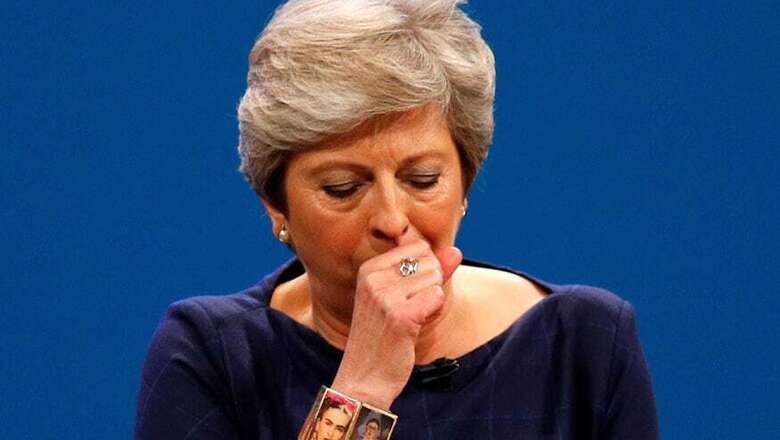
views
Brussels: European Union leaders formally agreed a Brexit deal on Sunday and urged Britons to back Prime Minister Theresa May's package in the face of furious opposition in the British parliament.
The 27 leaders took barely half an hour at a summit in Brussels to rubber-stamp a 600-page treaty setting the terms of Britain's withdrawal from the EU on March 29 and a 26-page declaration outlining a future free trading relationship.
May, who joined them shortly afterwards for what will be a brief meeting to seal the accord, now faces a struggle to get the deal, which has angered eurosceptics and EU supporters alike, through a deeply divided British parliament.
In an open letter to the nation, May said she would campaign "heart and soul" to get her Brexit deal through.
"It will be a deal that is in our national interest, one that works for our whole country and all of our people, whether you voted Leave or Remain," she said.
But any hope that she can clinch concessions to try to win over her critics was crushed by EU leaders.
"This is the deal," European Union chief executive Jean-Claude Juncker said on his way into the meeting.
"I believe that the British government will succeed in securing the backing of the British parliament," Juncker said, declining to comment on what might happen if May fails. "This is the best deal possible for Britain," he added.
Juncker called it "a sad day", saying Brexit was a "tragedy" and tough on both sides, and in a sign of worries ahead, Lithuanian President Dalia Grybauskaite said that the exit process was "far from over".
Michel Barnier, the Frenchman who has ground out the withdrawal treaty over the past 18 months, called the package a basis for close future ties, insisting: "We will remain allies, partners and friends."
And French President Emmanuel Macron said Britain's Brexit vote showed Europe needed reform. He stressed that Paris would hold Britain to tight EU regulations, notably on the environment, in return for giving it easy trade access.
The departure of a nation long sceptical of deeper EU integration was, Macron said, neither a moment for celebration nor mourning, but Britons' free choice.
This is the maximum
Dutch Prime Minister Mark Rutte, whose country is one of Britain's closest trading partners, praised May's handling of the difficult negotiations and said he was confident that she could see the deal through parliament in the coming weeks.
But he also had a warning for those in May's Conservative party as well as the Labour opposition who argue that a better deal can still be done before Britain leaves in four months if lawmakers deny her minority government support on Brexit.
"This is the maximum we can all do," Rutte said, shaking his head when asked if the EU might make more concessions.
Saying the EU "hates" Brexit, Rutte said: "Nobody's winning - we are all losing." But, he said, the deal was an acceptable compromise for all that gave May a chance to clinch a solution.
The biggest question now facing the EU is whether May's divided minority government can steer the deal, which foresees London following many EU rules for years to come to keep easy trade access, through fierce resistance in parliament in the coming weeks from both supporters and opponents of Brexit.
Grybauskaite said there were at least four possible outcomes if parliament blocks the package. She named three - that Britons would hold a second referendum, hold a new election to replace May or return to Brussels to try and renegotiate the package. A fourth is that Britain will simply crash out of the bloc on March 29 without legal clarity.
Both sides have been making preparations for such a "no deal" scenario, though the EU insists Britain has more to lose. The pound has strengthened since the deal came together over the past 10 days, but companies and investors remain nervous.
The package foresees little changing during a transition period lasting another two to four years. The two sides are due to start negotiations on their future ties after the Brexit day.
"We now need to get going on the 27 negotiating mandate for the talks on our future relationship, said an EU diplomat dealing with Brexit, adding it would be an extensive document covering trade, security, financial services, fisheries, phytosanitary controls and much more.
"But having it done here before the UK parliament vote would risk giving more ammunition to Brexiteers to bring down the Brexit deal. So we wait."
British opposition
Northern Ireland's Democratic Unionist Party that props up May's minority government said it would try to block the "pitiful" Brexit deal - because it binds London to many EU rules it will no longer decide on and as the DUP fears it could weaken the province's ties to Britain.
Sunday newspapers said different factions in her own Conservative party were preparing alternative plans to keep Britain closer to the EU should her deal fail as many expect.
Wrangling over how to keep open troubled Northern Ireland's land border with the EU without creating barriers with the Irish Republic dogged much of the Brexit talks. Britain's 300-year-old naval base in Gibraltar on Spain's southern coast, had also threatened to derail plans up until a last minute agreement.



















Comments
0 comment